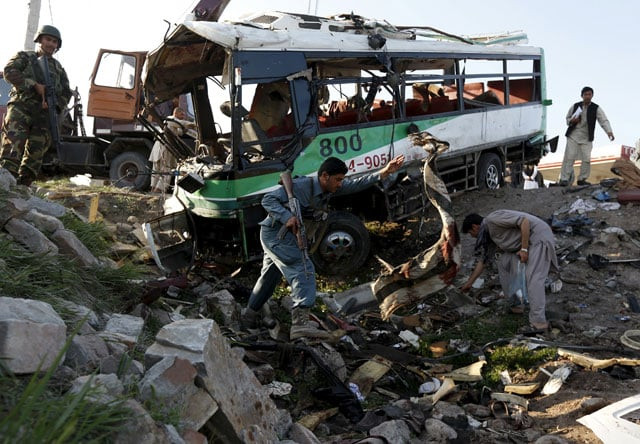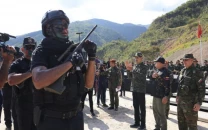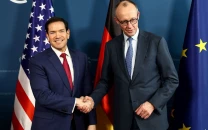An unsustainable state
Pessimistic commentators and analysts predict a steady implosion economically, militarily and in terms of its govt

Afghan policemen inspect next to a damaged police vehicle after a suicide attack in Jalalabad, eastern Afghanistan, April 11, 2016. PHOTO: REUTERS
Neither man has the support of the other; they have never been on the same page and yet another set of crises are convergent, this time on a very broad front. The Afghan economy is the proverbial basket case, governance at the formal level is a shambles and eroding fast and the military are under-resourced, insufficiently trained, poorly led and in part inclined towards supporting the Taliban anyway.
Economically the state had developed — or had imposed upon it — a regime of fiscal dependency that was based on the presence in the country of tens of thousands of high-spending foreign troops and their support infrastructure. It was only going to last as long as the troops were there. Now gone, the phony economy has imploded. As far as governance goes, the current iteration is as much one of the several experiments run by the John Kerry incubator unit than anything that the Afghans have put together for themselves; and the ‘Unity Government’ is no such thing. The elections that brought it into being were flawed, admittedly not as flawed as the election that preceded it but flawed nonetheless. The writ of the Kabul government is patchy to say the least and the Taliban have established parallel governance that is a virtual mirror of that which they used when last in power. Militarily Afghanistan is inadequately equipped today to fight a war that is anyway a foreign import. It has little by way of an air force and many recruits drift back towards their familial and tribal allegiances, and not infrequently in the direction of the Taliban. The Islamic State (IS) does not appear to be holding its gains and the Taliban have announced the commencement of their spring offensive.
Various attempts at peace-brokerage have failed. The omens do not look good for the latest effort either. The quadrilateral contact group made up of Afghan, Chinese, Pakistani and American delegates was announced with much fanfare and promptly ran into the sand. Little appears to have been learnt from previous efforts at peacemaking, and nothing at all learnt from the reasons for past failure in that direction. Admittedly, the crafting of wiggle-room in a conflict as complex as that in Afghanistan is a task of Herculean proportions, but as things stand, it is the Taliban that hold the best hand, have played their cards astutely and remain in the ascendant in terms of governance and militarily. None of the players is anywhere economically (beyond opium) and the state drifts and bleeds in a sea of unsustainability.
None of this is good news for Pakistan. The days when Pakistan played a distinctly shady role in the Afghan game are, to a degree if not entirely — behind us. Unfortunately, they are part of recent history and in a region where history matters our previous adventures into Afghanistan are the geopolitical equivalent of a very large albatross. Pessimistic commentators and analysts are seeing 2016 as make or break for Afghanistan, and predict a steady implosion economically, militarily and in terms of its government. We hope they are wrong.
Published in The Express Tribune, April 17th, 2016.
Like Opinion & Editorial on Facebook, follow @ETOpEd on Twitter to receive all updates on all our daily pieces.


1726734110-0/BeFunky-collage-(10)1726734110-0-208x130.webp)
















COMMENTS
Comments are moderated and generally will be posted if they are on-topic and not abusive.
For more information, please see our Comments FAQ